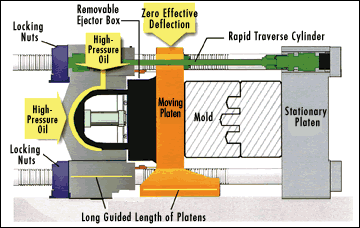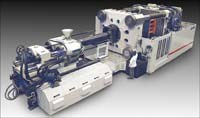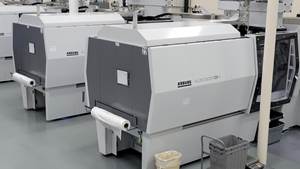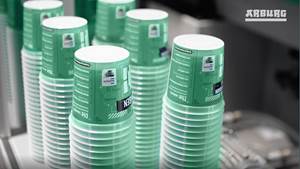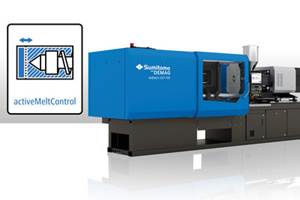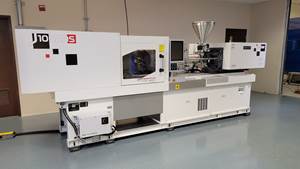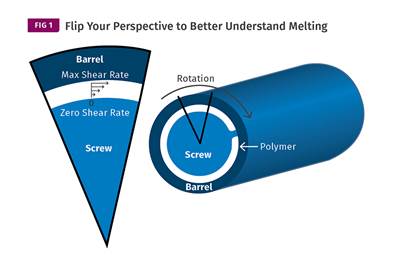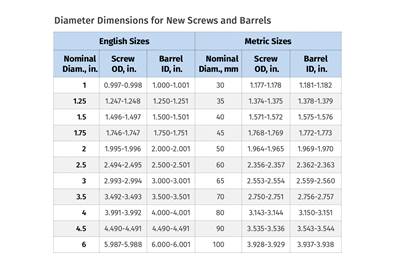Large Two-Platen Presses Gain Speed and Flexibility
An improved line of large two-platen injection presses offers new sizes plus greater speed, educed maintenance, more operator-friendly design, and added flexibility for a range of molding requirements.
An improved line of large two-platen injection presses offers new sizes plus greater speed, educed maintenance, more operator-friendly design, and added flexibility for a range of molding requirements. The upgraded Maxima line from Cincinnati Milacron ranges from 1125 to 6600 tons. They are designed to accommodate the growing popularity of multi-component injection, stack molds, extra-large mold carriers, and ability to handle everything from flat to deep-draw parts. They also provide easier access for maintenance. The new presses are also "global" ma-chines in that they will be built identically in the U.S., Germany, and China, except for electrical standards, safety provisions, and other local preferences.
Low-deflection clamp
The newest Maxima line replaces the MM and ML series and adds four new sizes—1460, 2025, 2990, and 4385 tons. Previously available sizes have been adjusted for today's global markets: 1125, 1300, 1820, 2330, 2585, 3315, and 6600 U.S. tons.
These presses retain design elements of the Maxima line. One of the most important features is the short-stroke central clamping cylinder on the moving platen. This produces 50% less platen deflection than most other two-platen presses, which clamp at the ends of the four tiebars and tend to "wrap" the platen around the mold, according to chief engineer Ron Hertzer. The result, he says, is less mold wear and improved part quality. Another key feature that differs from most other two-platen presses is full support of the tiebars from end to end. In particular, a rigid frame supports the ends near the moving platen.
Support for the platens carrying larger molds has been increased on the new models. Large "skates" under the moving platen and attached clamp-cylinder not only provide longer guided length but are also adjustable—a reportedly unique feature that ensures parallelism for heavy molds.
Here's what else is new on the updated Maxima models:
- Increased stroke and daylight—This has become important to molders of large parts such as "wraparound" auto fascias, says director of marketing Robert Strickley. He notes that to produce a 90-gal trash bin on an older Maxima 3500-ton machine, the molder had to pay extra for optional extended daylight. Now that part can be molded with the standard daylight specs. On the smallest model in the series, an 1125-tonner, the stroke is now 1900 mm and daylight is 2400 mm.
- Removable ejector box—On models of 1820 tons and up, this further increases the daylight capability for molds that don't require machine ejection. This feature allows one machine to mold both flat panels and very deep parts.
- Faster clam-ping—Two new features contribute to dry cycles 2 sec faster than any other machine in this size range, according to Hertzer. First, each locking nut on the tiebars now has its own hydraulic actuator right at the split nut. Older 1000- and 1500-ton models had a single actuator on each side of the machine that operated the top and bottom nuts by means of connecting rods. That meant less precise timing and required more maintenance. Second, redesigned hydraulic circuitry now allows tonnage decompression and unlocking the split nuts to overlap with cooling while the rapid-traverse cylinder holds the mold closed. Strickley points out that such a time-saving feature is not possible with clamping on the four tiebars.
- Improved ram seals—Also new is a special ram-seal arrangement that keeps dirt out of the system while keeping the ram centered and preventing metal-to-metal contact. A "wiper" plus two low-friction seals of PTFE filled with glass and molybdenum are said to prevent leaks, wear, and heat generation for extended life. The seals are energized by pressure from a rubber o-ring that reportedly is immune to compression set.
Beefed-up injection end
The Maxima series also boasts increased injection rates and screw speeds. The new 4400-tonner has two 854-oz injection units that each can shoot 11.5 oz/sec of PE and plasticate 1500 lb/hr of PE or 1100 lb/hr of PP.
Also new is an extra hole in the standard stationary platen to accommodate a second injector for hard/soft overmolding and two-color parts.
More operator-friendly
Milacron accommodated user requests by providing a much larger conical hole in the stationary platen to provide easier access to purgings and the nozzle tip. Milacron also moved the rapid-traverse cylinder back into the clamp area so that it does not extend into the injection area.
The hydraulic pumps are shielded so that sound levels reportedly are much lower at the operator station. New Maxima models also have more platform area for the operator and more room in the "cattrack" for mold utility lines.
Related Content
Consistent Shots for Consistent Shots
An integral supplier in the effort to fast-track COVID-19 vaccine deployment, Retractable Technologies turned to Arburg and its PressurePilot technology to help deliver more than 500 million syringes during the pandemic.
Read MoreInjection Compression Molding as Alternative to Thermoforming
Arburg will show its all-electric Allrounder 720 A press utilizing injection compression molding to create thin-wall IML cups from PP.
Read MoreAdaptive, Automatic Process Control for Injection Molding
Sumitomo (SHI) Demag says its activeMeltControl for all new IntElect 2 machines can automatically compensate for shot-weight variations.
Read MoreMedical Grade Injection Molding Machine Line is Cleanroom Ready
JSW America says the J100ADS-110U medical grade molding machine has been optimized to prevent dust, rust and other contaminants.
Read MoreRead Next
Understanding Melting in Single-Screw Extruders
You can better visualize the melting process by “flipping” the observation point so that the barrel appears to be turning clockwise around a stationary screw.
Read MoreTroubleshooting Screw and Barrel Wear in Extrusion
Extruder screws and barrels will wear over time. If you are seeing a reduction in specific rate and higher discharge temperatures, wear is the likely culprit.
Read MoreLead the Conversation, Change the Conversation
Coverage of single-use plastics can be both misleading and demoralizing. Here are 10 tips for changing the perception of the plastics industry at your company and in your community.
Read More




